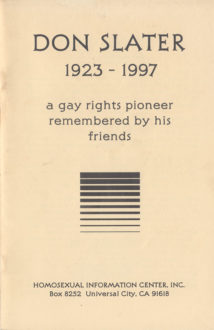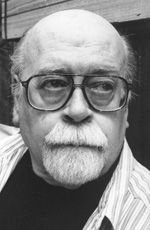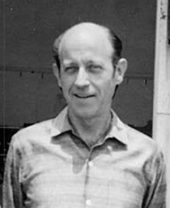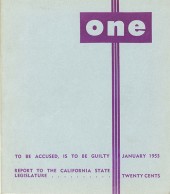 Forward
Forward
by Joseph Hansen
Don Slater:
a gay rights pioneer remembered by his friends
©1997 by Homosexual Information Center, Inc.
Jim Schneider, Chairman
Second Printing, revised
Assembled, edited, and composed by Joseph Hansen
Laguna Beach, CA
To take the measure of Don Slater’s courage, it has to be remembered that in 1953, when he launched the first openly-distributed gay magazine, ONE, same-sex acts were outlawed in every State of the Union. The news media never mentioned the word homosexual. Arrested, a homosexual unable to bribe his way out of trouble faced jail, loss of his reputation, his career, all hope of a decent future. So far as homosexuals were concerned, this was literally a police state.

Don was a born leader, but did not like the glare of publicity. He was wholly open as to his homosexuality, but still an intensely private person. After bravely breaking in 1965 with an organization he felt was too closeted, he formed a cutting-edge association, and issued a magazine that carried the campaign to widen and deepen understanding of gays into the straight world.
Inducted in 1943 and trained by the Army at Camp Hale, Colorado, Don would later fight the Military’s policy against admitting gays, and of discharging service people for same-sex acts. This was a lifelong battle on Don’s part. Randy Shilts reports on it admiringly in his devastating history, Conduct Unbecoming: Gays and Lesbians in the U.S. Military (1993).
His commitment to freedom of the press was adamant. When ONE magazine was stopped at the postoffice for alleged obscenity, Don fought them and won, at the Supreme Court level. A few years later, he mounted a picket line to protest anti-gay advertising restrictions by the mighty Los Angeles Times.
Basically a gentlemanly conservative, yet Don welcomed the Gay liberation movement of the lively 1960s and brought leaders from several far-out groups to speak at Tangents headquarters. Their tactics might be shocking, but they were fighting for the same civil rights as he was. He even took part in the first Gay Liberation Day parade in Los Angeles.
How did I come to know Don Slater? Wayne Placek, then my lover, was a contributor and volunteer worker at ONE, and in the late 1950s, shepherded me, on a streetcar, from Hollywood down to the famous seedy old building on Hill Street, on whose third floor, among garment sweatshops, the library was housed, and the magazine was published.
He introduced me to Don, a slight, dapper, quick-moving fellow with a mischievous glint in his eyes. I had written a story Wayne was sure Don would want to print. It was too long for the very slim magazine, but he promised to publish it, “somehow,” and eventually he did. Meantime, I wrote shorter, more manageable stories for him that he printed promptly.
And when ONE moved to roomy, sunlit new quarters on Venice Boulevard near Western, Don appointed me to the editorial board. For several months, he had been bringing in new people with new ideas, wanting the best for the magazine, hoping to attract more readers.

In the end, Don’s desire to reach beyond a gay readership to the general population, to give them a better understanding of a minority they knew too little about, while exciting to the rest of us, upset W. Dorr Legg, the Pooh-Bah of ONE, who on a startling evening in the Spring of 1965, burst in on our meeting and fired us all.
You will read more about this in the pages that follow, but I will say for myself that the resulting split in which Don created a new magazine, Tangents, opened for me five of the most exciting years of my life, involving me as writer, editor, artist, editorialist, book-reviewer, you name it, and calling on the talents of my artist wife, Jane, who designed some stunning covers, and contributed a new column directed at our Lesbian readers.
The magazine was snappy in appearance and lively in content, but Don’s pioneering, first with ONE, then with Tangents, ironically enough brought about our demise. For his opening up the subject of homosexuality (he preferred that word to “gay”) led naturally to the Gay Liberation Movement, which led magazines like Playboy, Cosmopolitan, even Good Housekeeping to begin discussing a subject once taboo, with more and more balance on the side of fairness as time passed.
Gay publishing began to flourish. Along came The Advocate, an ugly, amateurish tabloid funded by page after page of sleazy sex ads. For the lighter-minded among us, as a result of a series of liberal first amendment court decisions, large, glossy magazines appeared crammed with color photographs of naked young men. The demand for Tangents died. Sales plummeted, subscriptions were not renewed. Faced with a huge printer’s bill, Don grimly accepted the bitter truth, folded Tangents, and locked up the Cahuenga pass offices for the final time.
In the following years, first from cramped upstairs offices on Hollywood Boulevard, then from his wonderful Victorian house in Angelino Heights, whose ruling presence for one antic period was a rooster named Calhoun—Don issued a quarterly newsletter, often written by those of us who had once contributed articles and book reviews to the magazine.
The last of these newsletters came out in the fall of 1996, only a few months before his death. It pleases me that he and I were often in touch by telephone (and postcards: Don favored postcards) during the preparation of that issue, for which I reviewed two books. Once the newsletter was printed and mailed, Don had planned to drive down to Laguna Beach to have lunch with me, and a long afternoon’s visit, but mortality got in the way, and I regret that very much.

Still, here I have collected on paper a long “visit” with his closest friends, some of whom I hardly knew, and who knew Don in other ways than I did, at other times, in other situations—so I’m rewarded. To reminisce about Don Slater, who was, among other things, a hilariously funny fellow when he chose to be, is to have a warm and wonderful time.
When you’ve finished reading this booklet, I think you’ll agree with me. He was also a kind and caring friend, as Harry Hay and Billy Glover note elsewhere in this booklet. In 1993–94, when Jane lay dying from a stroke for long, dreary months in a nursing home, Don was our only friend who visited her not only in my company, but on his own, whenever he drove out to west L.A. He was a good man, through and through.
One word of caution to scholars of the next generation who chance upon this very informal work: don’t rely on it as an accurate accounting of facts. Memory plays tricks on all of us, and most of those writing in these pages relied on their memories. Even some of us who might style ourselves historians have mis-remembered dates and places and even causes and effects. Dates and places and causes and effects were not what I set out to capture here.
What I was after, rather, was a sense of a remarkable and (for all his prickliness) lovable man who fought to make this a more tenable world for the despised and rejected. He managed this better I think than even he realized. Often he managed it in spite of himself, hating the limelight as he did, and distrusting the strings attached to government and corporate funding.
To hear himself called a hero would make Don very uncomfortable. But it’s the truth—a hero was what he was.
©1997, 2017 by The Tangent Group. All rights reserved.
The HIC is grateful to Stephen Brzoska for his help in digitizing this text.

